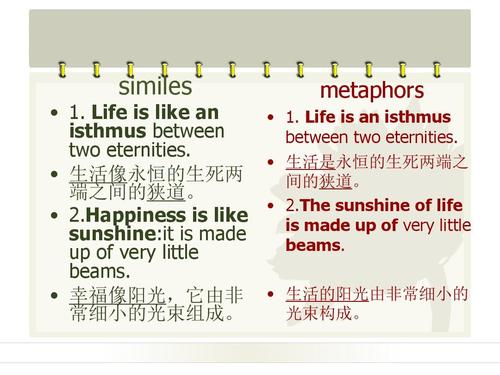Metaphor in English Poetry
Metaphor is a powerful literary device used in English poetry to create vivid imagery, convey complex emotions, and add depth to the meaning of a poem. By comparing two seemingly unrelated things, metaphors allow poets to evoke strong emotions and stimulate the imagination of the readers. Here are some examples of how metaphors are used in English poetry:
In symbolic metaphors, objects or concepts are used to represent deeper meanings or abstract ideas. For example, in William Wordsworth's poem "I Wandered Lonely as a Cloud," the poet compares himself to a cloud to convey the sense of isolation and detachment he feels.

Descriptive metaphors are used to create vivid images and sensory experiences for the readers. For instance, in Emily Dickinson's poem "Hope is the thing with feathers," hope is compared to a bird to emphasize its lightness, resilience, and ability to soar above adversity.
Emotional metaphors are employed to evoke specific feelings or moods in the readers. In Sylvia Plath's poem "Daddy," the speaker compares her father to a Nazi and herself to a Jew, using the metaphor to express her complex emotions of fear, anger, and resentment.
Conceptual metaphors are used to explore abstract ideas or philosophical concepts. In Robert Frost's poem "The Road Not Taken," the diverging paths in the woods are metaphorically linked to the choices and decisions we make in life, highlighting the theme of individuality and self-discovery.
Extended metaphors are sustained throughout a poem or a series of poems, creating a rich tapestry of interconnected images and ideas. In John Donne's "A Valediction: Forbidding Mourning," the compass is used as an extended metaphor to symbolize the enduring love and spiritual connection between the speaker and his beloved.
- Be original and avoid clichés to make your metaphors more impactful.
- Ensure that the metaphor is appropriate for the context and theme of the poem.
- Use sensory details and vivid language to enhance the imagery created by the metaphor.
- Experiment with different types of metaphors to convey complex emotions and ideas.
- Avoid mixing metaphors that may confuse or dilute the intended meaning of the poem.
Overall, metaphors play a crucial role in English poetry by enriching the language, stimulating the imagination, and inviting readers to explore deeper layers of meaning. Poets use metaphors as a creative tool to express their thoughts and emotions in a unique and compelling way, making their poems more engaging and memorable.







